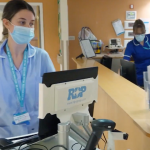GCSE and A-level pupils in England could be told what is on their exam papers in advance to help counteract the “disruption” they have faced as a result of the pandemic.
The Department for Education (DfE) and regulator Ofqual have unveiled proposals for the 2022 summer exams – which includes giving schools and colleges some choice over the topics that students are assessed on.
Education Secretary Gavin Williamson said it is “right that next summer’s arrangements take into account the disruption young people have faced over the past 18 months”.
His comments come after teachers across England finalised decisions on their pupils’ GCSE and A-level grades after this summer’s exams were cancelled for the second year in a row.
There was controversy last summer when an algorithm downgraded the results of thousands of students, before it was eventually scrapped, and teachers were given the authority to decide exam grades.
A consultation on the proposed measures for next year’s exams – which ends 1 August – sets out plans to provide aids, such as a formulae sheet in GCSE maths and an expanded equations sheet in GCSE physics.
Schools and colleges in England could also be given advance information on the contents of the exam to help students focus their revision, and teachers may be given some choice about what their students will be assessed on in GCSE English literature, history, ancient history and geography.
Mr Williamson said: “This year we have rightly asked those who know students best – their teachers – to determine young people’s grades.
“While I know the wait for results can be an anxious one, students and their families can look forward to receiving results next month in the knowledge that they will reflect young people’s hard work and enable them to progress to their next stage.
“Exams will always be the fairest way to assess students, which is why they will take place next year, but it’s right that next summer’s arrangements take into account the disruption young people have faced over the past 18 months.”
Plans for the summer 2022 GCSE, AS and A-level exams are expected to be confirmed early in the autumn term.
The government unveiled a £1.4bn COVID rescue plan to help children in England catch up on lost lessons at the start of June.
It includes giving 17 and 18-year-old students the option to repeat their final year if they have been badly affected by COVID, and up to 100 million hours of free tuition to help pupils catch up.
But the fund has been denounced as inadequate by Labour, unions and education campaigners, who claim the money pledged by the government over three years is only £50 per pupil per year.
Please use Chrome browser for a more accessible video player
Ofqual and the DfE are also running a consultation on arrangements for vocational and technical qualifications – which could allow colleges to streamline assessments and provide revision guidance.
Simon Lebus, Ofqual’s interim chief regulator, said: “With things slowly returning to normal, we are launching a consultation so that the flexibility we are building into qualifications will future-proof them against any public health crisis.
“And we want employers, colleges and universities to have the confidence in those qualifications to allow students to move to the next stage of their lives.
“We look forward to feedback on our plans from students, parents and teachers to ensure we understand their needs, particularly those whose education has been more harshly affected by the pandemic.”
Please use Chrome browser for a more accessible video player
It was previously announced that the school bubble system will also be scrapped in England in time for when schools go back after summer.
Only pupils who test positive for COVID-19 will have to self-isolate from 16 August, amid concerns too many would be absent self-isolating as coronavirus cases rise.
Ofqual is also considering how best to grade qualifications in 2022 to be as fair as possible to students and it will announce a decision in the autumn.
The DfE will continue to work with Ofqual on contingency plans in the event that it is not possible for exams to go ahead fairly and safely in 2022.






















